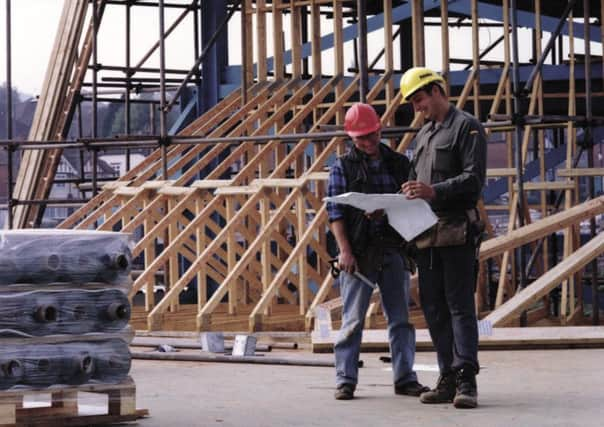Construct a career in the home building industry


Record numbers of young people are being funnelled into universities, a fact that irks Paul Newman.
He’s not against academia, just angry that those who don’t really want to do another three years of study and rack up a huge amount of debt feel they must tick the “degree-educated” box for fear of being left with limited career options.
Advertisement
Hide AdAdvertisement
Hide Ad“School leavers are encouraged to do A levels and go to university and see that as the only option. A lot of them don’t even realise that you can come into the construction industry at 16 as an apprentice and study at college part-time. I think schools should be promoting the construction industry as a viable alternative to university,” says Paul, MD of Barratt Homes Yorkshire East division.
He is on a crusade to persuade school leavers and existing tradespeople to look at the opportunities on offer in construction.
“We have bricklayers on £50,000 a year. It is not a second-rate job. You can command a very good wage, in many instances more than you can get doing a job that requires a degree. We have other young people who came to us as trainee quantity surveyors and are now, after ten years, earning about £40,000,” says Paul.
A chronic shortage of skilled workers has pushed up pay and created more opportunities. Britain is also losing skils to retirement. About 22 per cent of the workforce is over 50, and 15 per cent is in their 60s. Figures from the Construction Industry Training Board also predict that 2,870 bricklaying jobs will be created every year between now and 2020. Other trades are also in big demand.
Advertisement
Hide AdAdvertisement
Hide AdPaul Newman is keen to attract young blood to the profession and also wants to persuade small and medium-size sub-contractors to work for Barratt Homes.
While the company directly employs its own bricklayers and joiners, it sub-contracts work to specialist trades, including electricians, plasterers, roofers, tilers and decorators.
“Our existing sub-contractors are working beyond their capacity and so we are trying to reach out to others in the region. A lot of them might think they are too small to work for a national house builder like us but that is not the case.
“We recently had two young plumbers who worked for a contractor. They spotted the opportunity to branch out and set up on their own doing contract work for us. They now employ three other plumbers.
Advertisement
Hide AdAdvertisement
Hide Ad“A scaffolder who started working for us 13 years ago now employs 190 people,” says Paul, who is organising a “Meet the Builder” event to give tradespeople information about working with the house builder on a sub-contract basis.
Devoting all their resources to a contract with one company is something that many small firms fear in case they get caught in a cycle of “feast and famine” but Paul says: “There is plenty of work to go around and I can’t see that changing for the next five to six years in our area.
“Once York’s Local Plan is approved, it should deliver more than 800 new homes a year, which equates to about 20 active developments. At the moment, there are four. The housebuilding industry is also getting unprecedented levels of support from the government in terms of planning and the help-to-buy scheme.
“Another benefit for our contractors is that we pay regularly so cash flow is not a problem for them.”
Advertisement
Hide AdAdvertisement
Hide AdBarratt encourages its contractors to take on apprentices and mentors them through the process.“We also employ apprentices ourselves,” says Paul, 46, who is a prime example of where going into a construction industry straight from school can lead. He left school at 16 with “basic O levels” and joined a youth training scheme working in stock control for BP Chemicals before moving to Barratt as a building site clerk. He progressed to quantity surveyor and became managing director of Barratt Homes Yorkshire East at the age of 36.
“You don’t need a degree to progress in this industry,” he says.
*For details of the Barratt Meet the Builder event, which is planned for January, contact Tel: 01904 617 660.